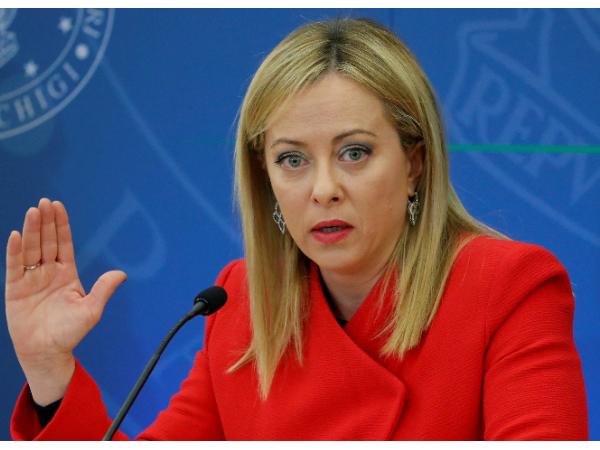Italy’s Breakup with China: A Closer Look at the Belt and Road Pact
Italy’s decision to join China’s Belt and Road Initiative back in 2019 raised many eyebrows across the globe. Many saw it as a significant shift in the global economic order, while others criticized it as Italy selling out its sovereignty to an authoritarian regime. However, just two years later, Italy seems to have done a U-turn on its position and has decided to distance itself from China. In this blog post, we take a closer look at why Italy broke up with China and what implications this may have for the future of the Belt and Road Pact.
Introduction to the Belt and Road Pact
The Belt and Road Pact is a proposed economic and security agreement between China and the countries of Central Asia, Southeast Asia, and Europe. The pact would create a “new Silk Road” of trade and investment, as well as a network of infrastructure projects to connect the participating countries.
The Chinese government has been seeking to increase its economic and political influence in the region through the Belt and Road Initiative (BRI), which was first proposed by Chinese President Xi Jinping in 2013. The BRI is a vast infrastructure and investment initiative that aims to connect China with the rest of Eurasia through a series of land and sea routes.
While the full details of the Belt and Road Pact have not been made public, it is thought to include provisions for increased trade and investment between China and the participating countries, as well as joint development of infrastructure projects. The pact is also intended to serve as a platform for cooperation on security issues, such as counterterrorism and combating transnational crime.
Some Western observers have raised concerns that the true goal of the Belt and Road Pact is to extend Chinese influence over participating countries, rather than simply promote economic development. They point to China’s history of using economic aid as a tool for political coercion, as well as its track record of flouting international rules and norms. Others argue that the benefits of increased trade and investment outweigh any potential risks posed by Chinese involvement, and that the pact could help stabilize an often-troubled region.
Also Read – Breaking Down the 2023 Morris County Girls Lacrosse Tournament Bracket
Background Information on Italy’s Relationship with China
Since the early 2000s, Italy has been working to strengthen its relationship with China. In 2003, the two countries signed a Memorandum of Understanding on Bilateral Cooperation, which led to the creation of a Joint Economic and Trade Commission. In 2006, they signed a Comprehensive Economic Partnership Agreement, and in 2007, they signed a Framework Agreement on Strategic Partnership.
In 2008, Chinese President Hu Jintao visited Italy, and the two countries issued a Joint Statement on Strengthening Strategic Partnership for Peace and Development. In 2010, Italy became the first G8 country to sign up to China’s Belt and Road Initiative (BRI). The following year, then-Prime Minister Silvio Berlusconi led a large Italian delegation to China, during which numerous agreements were signed between businesses from the two countries.
In 2016, Italy and China held their first ever bilateral summit, during which they issued a Joint Declaration on Further deepening China-Italy all-round cooperative partnership under new circumstances. During this summit, the two countries also signed an agreement on jointly promoting the BRI.
In 2019, however, things started to sour between Italy and China. On March 23rd of that year, Italian Deputy Prime Minister Luigi Di Maio met with Hong Kong pro-democracy activist Joshua Wong while he was visiting Rome. This angered Beijing, as Wong is seen as a threat to Chinese sovereignty over Hong Kong. Then on April 6th, Italian Senate President Maria Elisabetta Albert

Reasons Behind Italy’s Decision to Leave the Pact
In March of this year, Italy became the first G7 nation to sign up to China’s Belt and Road Initiative (BRI). The move was seen as a major coup for Beijing, as it brought one of the world’s most advanced economies into its orbit.
However, just six months later, Italy appears to be having second thoughts. The country’s new populist government is reportedly planning to back out of the deal, amid concerns about China’s growing influence in Europe.
So what exactly has changed in such a short space of time? And what does this say about China’s flagship foreign policy initiative?
There are a number of reasons behind Italy’s decision to leave the pact. Firstly, there is a growing feeling in Rome that the deal is not in the country’s best interests. Under the terms of the agreement, Italy would have been required to invest heavily in infrastructure projects in Chinese-controlled territories.
This would have left the country heavily indebted to Beijing, and given China considerable leverage over its economy. There are also fears that Beijing could use these infrastructure deals to gain access to sensitive military technology.
Another factor influencing Italy’s decision is the wider geopolitical environment. The Trump administration has been increasingly vocal in its criticism of China, and has urged allies not to do business with Beijing. This has made some countries wary of getting too close to China.
Italy is also
Impact of Italy’s Withdrawal
In April of 2018, Italy became the first major Western power to sign a Memorandum of Understanding (MOU) with China on the Belt and Road Initiative (BRI). The move was seen as a major coup for Beijing, as it gave the BRI significant legitimacy among Western nations.
However, just two years later, Italy has announced its intention to withdraw from the MOU, citing concerns about Chinese investment in the country. This is a major setback for Beijing, and could have far-reaching implications for the BRI.
There are a number of reasons why Italy decided to break ties with China. Firstly, there was growing public opposition to Chinese investment in Italy. Many Italians were concerned about Beijing’s motives, and feared that Chinese companies would only be interested in exploiting Italian resources.
There was also unease within the Italian government about the terms of the MOU. Some officials felt that it favored Chinese companies too much, and that Italy had given away too much in return for Chinese investment. In particular, there were concerns about clauses that would have allowed China to use Italian ports for military purposes.
There is a wider geopolitical context at play here. The United States has been increasingly vocal in its opposition to the BRI, and has put pressure on countries like Italy not to engage with China on the initiative. Rome may have decided that it is simply not worth risking its relationship with Washington by continuing to work with Beijing on the BRI.
Also Read – Guardians of the Galaxy Vol. 3: The Controversial Decision That Won Over Fans
Potential Aftermath of Italy’s Withdrawal
When Italy officially withdrew from China’s Belt and Road Initiative in March of this year, it sent shockwaves throughout the global community. As one of the largest and most influential countries involved in the ambitious project, Italy’s departure could have far-reaching consequences.
For starters, it could put a significant strain on relations between Rome and Beijing. Italy was one of the first major Western powers to sign onto the Belt and Road Initiative, and its participation was seen as a vote of confidence in China’s ability to lead the project. Withdrawing now could be interpreted as a loss of faith in China’s leadership, which could lead to a deterioration of bilateral relations.
Additionally, Italy’s withdrawal could also have implications for the future of the Belt and Road Initiative itself. The project has already been beset by criticism and skepticism, and losing such a high-profile participant is likely to further damage its credibility. This could make it difficult for China to secure other partners moving forward, which could ultimately doom the initiative to failure.
How Other Nations are Responding
In the wake of Italy’s decision to abandon its Belt and Road Initiative pact with China, other nations are beginning to reassess their own involvement in the project. France, Germany, and the United Kingdom have all voiced concerns about the transparency and accountability of the Chinese government, as well as the overall debt burden that participating countries could face.
The United States has been a vocal critic of the Belt and Road Initiative from the start, arguing that it is nothing more than a tool for China to extend its economic and political influence around the world. In recent months, the Trump administration has stepped up its efforts to block funding for projects related to the initiative, and it is now pressuring other countries to do likewise.
Japan has also been increasingly critical of China’s role in the Belt and Road Initiative, particularly after a Chinese state-owned company was awarded a contract to build a railway line in Kenya over a Japanese-backed bid. As one of China’s closest neighbors and a major regional power, Japan’s opposition could be a significant setback for Beijing’s plans.
It seems that Italy’s break with China on the Belt and Road Initiative is part of a wider trend among Western nations who are growing wary of Beijing’s ambitions. With more countries beginning to distance themselves from the project, it remains to be seen how much longer China will be able to sustain its grandiose plans for global domination through infrastructure.
Conclusion
Italy’s decision to break away from the Belt and Road Pact is a clear indication of the growing rift between China and its European allies. This move has highlighted the need for increased scrutiny on China’s activities in Europe, as well as a better understanding of what exactly the terms of this agreement entail. While there are still many questions surrounding this issue, it is certain that Italy’s decision will reverberate across Europe – prompting other nations to take similar actions or face potential consequences.




